
INTEGRATIVE AND COMPARATIVE BIOLOGY
metrics 2024
Connecting Ideas, Elevating Biological Research.
Introduction
INTEGRATIVE AND COMPARATIVE BIOLOGY, published by Oxford University Press Inc, is a prestigious journal that explores the interdisciplinary facets of biology, bridging gaps between animal science, plant science, and broader biomedical research. With an impressive impact factor and a reputation for excellence, this journal is categorized in the Q1 quartile for both Animal Science and Zoology, as well as Plant Science, demonstrating its significant influence in these fields. Indexed in Scopus, the journal ranks 72 out of 490 in Animal Science and Zoology and 133 out of 516 in Plant Science, placing it in the 85th and 74th percentiles, respectively. Since its inception in 1961, INTEGRATIVE AND COMPARATIVE BIOLOGY has provided a platform for cutting-edge research and innovative methodologies, fostering collaboration among researchers and practitioners. Researchers and students alike can access its content through a variety of flexible options, ensuring that the latest findings are widely disseminated and available for future exploration. This journal is essential for anyone seeking to stay at the frontier of integrative biological research.
Metrics 2024
 0.87
0.87 2.20
2.20 2.80
2.80 139
139Metrics History
Rank 2024
Scopus
IF (Web Of Science)
JCI (Web Of Science)
Quartile History
Similar Journals
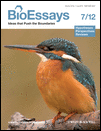
BIOESSAYS
Advancing the Frontiers of Biological UnderstandingBIOESSAYS, published by WILEY, is a leading academic journal dedicated to the dynamic fields of biochemistry, genetics, and molecular biology. With an impressive impact factor and recognized as a Q1 journal in its category for 2023, it ranks 49 out of 221 in the Scopus database, placing it within the 78th percentile among its peers. Since its inception in 1984, BIOESSAYS has served as a vital platform for researchers, professionals, and students, facilitating the dissemination of pivotal findings, innovative theories, and review articles that shape the current understanding of biological sciences. Although it does not offer open access, the journal remains key for those seeking to stay at the forefront of scientific discovery and discussion within this ever-evolving discipline. With its commitment to high-quality, peer-reviewed content, BIOESSAYS continues to influence future research directions and academic discourse.

Frontiers in Physiology
Transforming understanding of physiological processes.Frontiers in Physiology, published by FRONTIERS MEDIA SA, is a leading open-access journal that has been at the forefront of physiological research since its inception in 2010. As a reputable publication based in Switzerland, it aims to foster the dissemination of groundbreaking findings across various domains of physiology, engaging a global audience of scholars and practitioners. With a commendable Q2 ranking in the fields of both general physiology and medical physiology for 2023, this journal stands out in its field, achieving a significant Scopus rank of #32/113 in medical physiology and #58/193 in biochemistry, genetics, and molecular biology. Frontiers in Physiology not only commits to maintaining high scholarly standards but also ensures that all its articles are freely accessible, thereby promoting collaborative knowledge exchange. With a clear focus on advancing our understanding of physiological processes, the journal plays a crucial role in the development of innovative approaches to health and disease, making it an essential resource for researchers, professionals, and students alike.
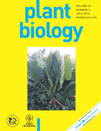
PLANT BIOLOGY
Exploring the Depths of Plant BiologyPLANT BIOLOGY is a prestigious academic journal published by Wiley, dedicated to advancing knowledge in the fields of plant science, ecology, and evolutionary biology. With an impressive impact factor and ranking in the Q1 category for Ecology, Evolution, Behavior and Systematics, and Plant Science as of 2023, it stands at the forefront of research dissemination. The journal encompasses a broad scope of plant biology topics, providing a critical platform for researchers to share innovative findings and foster interdisciplinary collaboration. Available in both print (ISSN: 1435-8603) and online formats (E-ISSN: 1438-8677), it ensures accessibility through open access options. As a crucial resource for professionals, researchers, and students alike, PLANT BIOLOGY cultivates a deeper understanding of plant systems and their ecological significance, making it an essential addition to the library of anyone dedicated to the study of biology and the environment.
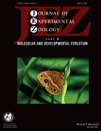
JOURNAL OF EXPERIMENTAL ZOOLOGY PART B-MOLECULAR AND DEVELOPMENTAL EVOLUTION
Exploring the intricate tapestry of life through experimental zoology.JOURNAL OF EXPERIMENTAL ZOOLOGY PART B-MOLECULAR AND DEVELOPMENTAL EVOLUTION, published by Wiley, is at the forefront of research in the fields of molecular biology, developmental biology, and evolutionary science. With an impressive impact factor reflective of its significance, this journal maintains a prominent position in the academic landscape, evidenced by its Q1 ranking in Animal Science and Zoology, as well as Ecology, Evolution, Behavior and Systematics for 2023. It rigorously publishes innovative research spanning a wide array of topics pertinent to molecular and developmental evolution, making it an invaluable resource for researchers, professionals, and students alike. This journal not only offers Open Access options, enhancing the visibility of groundbreaking findings, but also supports interdisciplinary collaboration by integrating insights from genetics and molecular medicine. With a commitment to advancing knowledge, the journal is poised to contribute significantly to our understanding of biological processes and evolutionary dynamics through its convergence of research from 2003 to 2024.

Evolutionary Biology
Bridging Disciplines in the Study of Life's DiversityEvolutionary Biology is a distinguished academic journal published by Springer, focusing on the intricate fields of ecology, evolution, behavior, and systematics. This journal, with the ISSN 0071-3260 and E-ISSN 1934-2845, has established itself as a critical platform for cutting-edge research and innovative ideas that shape our understanding of biological evolution and its implications. Operating from Germany, it ranks in the Q2 quartile in its category for 2023, placing it in the top tier of journals recognized for quality and impact, with a Scopus rank in the 66th percentile among its peers. Despite not being Open Access, this journal ensures comprehensive dissemination of knowledge essential for researchers, professionals, and students passionate about evolutionary studies. With a publication history tracing back to 1993 and converging years up to 2024, Evolutionary Biology continues to significantly impact the academic landscape, fostering dialogue and collaboration across various disciplines within the biological sciences.

JOURNAL OF EVOLUTIONARY BIOCHEMISTRY AND PHYSIOLOGY
Pioneering Research in Evolutionary Biochemistry and PhysiologyJOURNAL OF EVOLUTIONARY BIOCHEMISTRY AND PHYSIOLOGY, published by PLEIADES PUBLISHING INC, is a pivotal periodical that delves into the intricate relationships between biochemical processes and evolutionary dynamics. With its ISSN 0022-0930 and E-ISSN 1608-3202, this journal serves as a comprehensive platform for researchers, professionals, and students dedicated to understanding the physiological adaptations and biochemical mechanisms influenced by evolutionary pressures. Although it is not an open access journal, it offers valuable insights across its historically significant coverage spanning from 1972 to 2017, making it an essential resource for those working in agricultural, biological, and molecular sciences. Despite its current Scopus rankings revealing limited visibility within its fields, the journal remains committed to fostering scholarly dialogue and advancing knowledge in the realm of evolutionary biochemistry, especially for those exploring the ecological, genetic, and integrative physiological aspects of life.
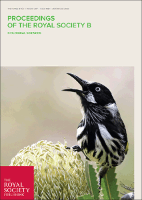
PROCEEDINGS OF THE ROYAL SOCIETY B-BIOLOGICAL SCIENCES
Unveiling Innovations in Biological ResearchPROCEEDINGS OF THE ROYAL SOCIETY B-BIOLOGICAL SCIENCES, published by the esteemed Royal Society, stands as a premier platform for disseminating cutting-edge research in the fields of Biological Sciences. With an impressive impact factor reflective of its high citation rates and scholarly contributions, this journal encompasses a wide array of disciplines, including Agricultural and Biological Sciences, Biochemistry, Genetics and Molecular Biology, Environmental Science, and Immunology and Microbiology, consistently ranking in the Q1 category across these fields. Since its inception in 1946, it has been committed to advancing our understanding of biological systems and informing evidence-based practices. Researchers and academics can submit their work without the Open Access barrier, thereby maintaining the integrity of the disciplinary discourse while providing comprehensive insights. The journal's location in the United Kingdom also positions it at the heart of global scientific innovation, making it a vital resource for professionals and students alike who are eager to explore the latest trends and breakthroughs in the biological sciences.
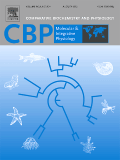
COMPARATIVE BIOCHEMISTRY AND PHYSIOLOGY A-MOLECULAR & INTEGRATIVE PHYSIOLOGY
Exploring Cutting-edge Research in Comparative Physiology.Comparative Biochemistry and Physiology A-Molecular & Integrative Physiology, published by Elsevier Science Inc, serves as a pivotal platform for cutting-edge research in the fields of biochemistry, physiology, and animal sciences. The journal, holding an esteemed presence with an ISSN of 1095-6433 and E-ISSN 1531-4332, spans a remarkable history of contributions since its inception in 1960, showcasing significant findings up to 2024. As a Q1 quartile journal in Animal Science and Zoology and featuring competitive rankings across various biochemistry and physiology disciplines, it stands out as a leading resource for both established researchers and emerging scholars alike. The journal is committed to publishing high-quality, peer-reviewed articles that deepen our understanding of molecular and integrative physiology, playing an essential role in advancing scientific knowledge and fostering interdisciplinary collaboration. With access options that prioritize the dissemination of impactful research, Comparative Biochemistry and Physiology continues to shape the dialogue within these dynamic fields.

Cold Spring Harbor Perspectives in Biology
Advancing Biological Insights for Tomorrow's InnovatorsCold Spring Harbor Perspectives in Biology is a prestigious academic journal published by COLD SPRING HARBOR LAB PRESS that serves as a vital resource in the fields of Biochemistry, Genetics, and Molecular Biology. With an impressive impact factor and categorized in the Q1 quartile for its contributions, this journal is renowned for curating comprehensive reviews that synthesize the latest advancements and ongoing research in these dynamic and interconnected disciplines. Since its inception in 2009, the journal has played a pivotal role in advancing scientific knowledge through high-quality articles that cater to researchers, professionals, and students alike. Although it operates on a traditional subscription model, its contributions are indispensable for those seeking to remain at the forefront of biological research and its myriad applications. With a commendable ranking of #19 out of 221 in general biochemistry, genetics, and molecular biology on Scopus, this journal ensures that its readers have access to cutting-edge insights and a rigorous academic discourse.
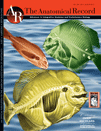
Anatomical Record-Advances in Integrative Anatomy and Evolutionary Biology
Transforming Knowledge into Groundbreaking Discoveries.Anatomical Record-Advances in Integrative Anatomy and Evolutionary Biology, an esteemed journal published by WILEY, serves as a pivotal platform for scholars in the fields of anatomy, biotechnology, ecology, evolutionary biology, and histology. With an ISSN of 1932-8486 and an E-ISSN of 1932-8494, this journal has demonstrated its academic rigor by maintaining a Q2 ranking across multiple relevant categories, including Anatomy and Biotechnology, and consistently achieving a high Scopus ranking in its respective fields. Its scope, covering integrative approaches to anatomical research and evolutionary studies, fosters interdisciplinary collaboration and innovation. Researchers and practitioners can access the journal through various open-access options, ensuring that groundbreaking findings are disseminated widely. As a vital resource for advancing knowledge and exploring emerging trends, this journal greatly contributes to the understanding of biological systems and evolutionary processes, making it an essential read for those dedicated to pushing the boundaries of their respective disciplines.